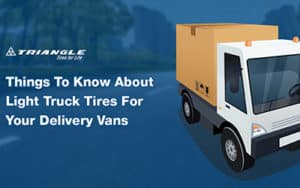The logistics and delivery business is poised for a comeback as the end of the pandemic nears.
According to the 2022 Emerging Markets Logistics Index by Agility, while the Philippines experienced a decrease in domestic logistics opportunities due to the pandemic, it still held ground as one of the top 20 countries with the most potential to grow in the logistics market in the next five years.
Logistics and delivery companies must ensure their fleets are in top shape to take advantage of the returning demand as more services reopen—that includes equipping your vehicles with quality tires optimized for logistics.
How are Truck Tires Different from Passenger Car Tires?
The difference between truck tires and passenger car tires is like the difference between running shoes and work boots. They both serve the same purpose, but you use them in different circumstances.
Trucks carry heavier loads across greater distances than passenger cars. Thus, truck tires are constructed with stronger, harder materials and more rigid sidewalls. The treads are also deeper, though the pattern varies for both kinds.
The air pressure required also varies. Passenger tires have less air pressure relative to their size to make the ride smoother for motorists, which is less of a concern with truck tires as long as the cargo arrives safely. Higher air pressure means stiffer wheels, suitable for shipments but bumpier for passengers.
Truck tires are admittedly more expensive, considering the increased material costs. However, they are long-term investments as they last longer and require replacing less often than passenger tires used in delivery trucks.
Like how wearing running shoes on a hike in rough terrain can lead to a sprained ankle, using the wrong kind of tire can be dangerous and lead to both damaged cargo and injured drivers.
You can use this guide to learn more about the right kind of tire for your needs.
5 Factors to Consider When Buying Commercial Truck Tires for Delivery Vehicles
Choose the right tire for you by keeping in mind these five factors.
1. Trucking routes
Understanding the condition of the road your trucks take is essential. Do they take the highway or dirt road? Does it often rain on these routes, or are they usually dry? Is the area generally warm or cold? These factors can affect the performance of your tires, so using the right type can save you from future issues and reduce your operating costs.
Another thing to consider is last-mile delivery or the delivery step where a customer receives their parcel. These are frequently in urban areas with higher congestion and more turns, which can wear tires faster compared to driving along straight highways.
For example, the TR685 is designed for highways and rainy areas, while the TR668 is an all-purpose wheel for most road conditions. When driving in the Philippines, where it often switches from hot and dry to rainy and wet, a versatile tire like the TR668 might be better for your business.
2. Vehicle type and cargo load
The delivery vehicle determines the size of the tires you need. Pick-up trucks and public utility vehicles generally use Passenger Car Radial tires (PCR), while heavier vehicles like delivery vans use Light Truck Radial tires (LTR). Even heavier vehicles use Truck Bus Radial tires (TBR) or Heavy Equipment Tires (HET).
Your vehicles will need different tires depending on the weight requirements. Ensure the weights of both the truck and load are within the tires’ capacity to be safe. You may want to choose tires designed with a higher loading capacity, such as the TR689A.
Additionally, some tires offer smoother rides which might be necessary for more fragile cargo.
3. Tire material
The rubber in tires varies in hardness. Tires made with softer rubber generally have better traction on roads and smoother rides. However, soft rubber is also less fuel efficient and durable than hard rubber tires. Hard tires are more durable at the cost of less traction, which can be an issue depending on road conditions.
For last-mile delivery, you need tires that balance smooth traction and fuel efficiency, like the TR656, which has a cool running tread compound that lowers fuel consumption and zigzag grooves in the treads that provide excellent grip on dry or wet city roads.
4. Warranty coverage and duration
Consider the warranty before you make a purchase. High-quality tires are an investment, so you want to ensure they last for the entire expected duration. Triangle Tires offers a three-year warranty with broad coverage, subject to conditions.
5. Repair and post-purchase services
No matter how careful you are, tires will eventually suffer from wear and tear. The tread patterns will rub out, and the sidewall will lose some rigidity. As this is unavoidable, consider purchasing from businesses that offer repairs or retreading. Repairs are always cheaper than buying new tires and extend the lifespan of your investment.
Tread Carefully
When deciding about truck tires, consider your company’s situation before committing. A good tire is an investment that ensures the safety of your employees and the quality of service you provide to your customers.
If you’re looking for quality tires, Triangle Tires can help. We have a wide array of tires—from passenger cars and light trucks to heavy equipment vehicles—available for delivery at an affordable price.
Browse our tire catalog or contact us to discuss how we can help you.


